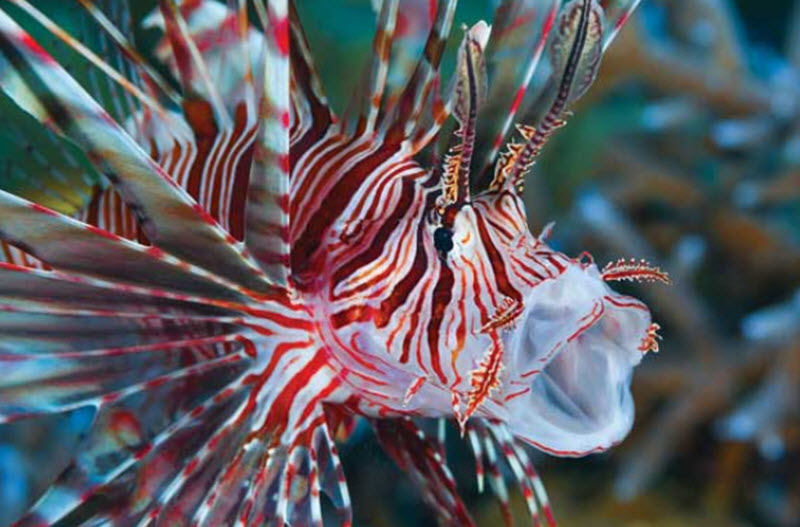The lionfish is an interesting marine animal that goes by a variety of other names. It has also been called the firefish, butterfly-cod and zebrafish. Its proper name is “Pterois.”

The various names for this fish come from its interesting appearance. They have stripes that go down their entire body like a zebra. They also have long fins and quill-like spines. The spines fan out in an ornate display that can resemble a mane, thus the tern “lionfish.”
In Aquariums
Lionfish are sought after by saltwater and reef aquarium enthusiasts because of their unique appearance and powerful presence.
It should be stated however that this is a difficult fish to care for. Only experienced pet owners who have been working with saltwater aquariums for years should try to undertake adding this fish to their tank.
Lionfish can be demanding and aggressive. The most dangerous drawback of note is that the lionfish is poisonous.
The long spines of the lionfish are not just for show; the spines contain poison and the long spines are meant to deter predators and harm those who dare to attack anyway.
While the poison is not typically fatal for humans, in rare cases it can be extremely dangerous; such as when stinging young children, elderly, those with heart conditions and those with allergic reactions.
The lionfish is quite beautiful but should only be owned by experienced aquarium owners.
In The Wild
While lionfish can be hard to care for in an aquarium, they are quite proficient at surviving in the wild; sometimes to a fault.
There are twelve species within the genus, but two of them in particular (the red lionfish and the common lionfish) have invaded the eastern coastline of the United States and have established themselves as one of the most dangerous widespread species in recent history.
The lionfish is originally from areas such as Japan and Korea. It found its way to the United States due to the pet trade.
How they came into the wild along the coastline is uncertain, but it is believed that a large contributing factor is unsatisfied pet owners setting their lionfish free after realizing how hard it was to take care of them.
Because of its long poison spines and threatening appearance; the lionfish is well equipped to survive in the wild. After being introduced to a new environment in which it had no natural predators; it was able to take control of the area widely unopposed.
Extensive measures are now having to be taken to try to eradicate wild lionfish who are destroying the natural environments they invade.
This is another reason why only experiences aquarium owners should try to adopt a lionfish. Being unable to care for these magnificent fish and then setting them free has had terrible and unforeseen consequences.
The entire situation is regrettable but not the fault of the lionfish; such things tend to happen when an animal is introduced to an environment that is not natural to them.
